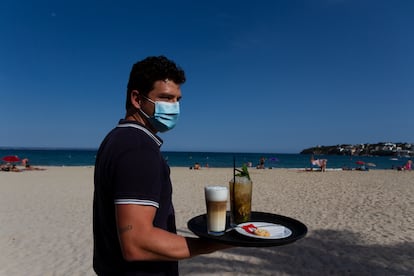Spain invites regions to reopen to foreign tourists before July 1
The Spanish health minister says that regional authorities are welcome to launch pilot schemes to reactivate the tourism industry, which has been devastated by the coronavirus crisis
The Spanish government has taken another step forward to facilitate the arrival of foreign tourists. Since announcing that Spain would open to international visitors from July 1, the government has made a series of moves to encourage tourists to return to the country. The coronavirus crisis has devastated the tourism industry, which accounts for 12% of Spain’s gross domestic product (GDP).
In an effort to reactivate the sector, the government announced that the compulsory 14-day quarantine for overseas arrivals would end by July 1. The Tourism Ministry then proposed that safe travel corridors be opened up between regions in the European Union with a similar level of control over the outbreak.
This plan was confirmed on Monday when the government gave the green light to a pilot tourism scheme that will see 10,900 visitors from Germany arrive in the Balearic Islands from June 15. And on Tuesday, Health Minister Salvador Illa announced that other regions in Spain were welcome to launch their own pilot program. “Other regions have the possibility of putting it into practice as a pilot scheme if they consider it appropriate,” he said.
British deal ruled out
Spain receives many visitors from the United Kingdom as well as from Germany. But while tourists from Germany will be allowed to visit the Balearic Islands from June 15, this option will not be available to Britain. “We are in a similar epidemiological situation as Germany but that is not the case with the United Kingdom,” said Iago Negueruela, the head of the Balearics tourism department. “What’s more, with Germany we are negotiating within EU conditions and the Schengen zone, which is not the case with the United Kingdom.”
Negueruela, however, did say that talks with UK tour operators and authorities were underway to enable the arrival of British tourists as soon as possible.
Pilot scheme in Balearic Islands
The Balearic Islands will be the first region in Spain to receive foreign tourists. Under the plan, tour operators and airlines will have to provide the regional government with a list of passengers to ensure the cap of 10,900 tourists has not been exceeded. When the visitors arrive at the airport, they will need to fill out health forms and present them to the authorities, who will then take their temperature. If the tourist has no coronavirus symptoms, they will be able to begin their holiday on the island and will not have to observe the 14-day quarantine. All visitors, however, need to provide their contact information and the address of where they are staying, be it at a hotel or their second residence. A similar procedure will take place in airports across Spain once the country enters the “new normality” at the end of the deescalation process.

The protocol is different if a tourist has coronavirus symptoms, for example, a temperature above 37.5ºC. In this case, the individual must take a PCR test for Covid-19. “If it comes back negative, they can continue with their vacation. If it comes back positive, they will have to self-isolate,” explained Francina Armengol, the premier of the Balearic government, on Tuesday. If the tourist who tests positive has a holiday home in the archipelago, they will be able to spend the quarantine period at that residence. If they are staying at a hotel, the regional government will provide alternative accommodation for them at no extra cost. Authorities will also track down the contacts of the affected individual and test them for Covid-19.
The Spanish government has also proposed a similar scheme for the Canary Islands, but the regional authorities there have called for stricter security measures. “We feel that the safety conditions are insufficient and that this project does not contemplate the necessary conditions for it to be escalated to meet the large number of visitors who will come after the opening [of borders on July 1], and for this reason, it will be ineffective for testing the application of measures that guarantee health security,” explained Yaiza Castilla, the head of the Canaries tourism department, in a letter sent Friday to the Tourism Ministry.
Benefits of scheme
There are three main advantages to partially reopening borders before July 1. First the pilot scheme will test the coronavirus safety protocols in airports, hotels, beaches and other leisure centers; secondly, it will trial the efficiency of the healthcare and tracing systems; and third, it will give destinations such as the Balearic Islands an edge over their competitors.
“[The pilot scheme] will help sell trips and stops delaying sales due to the uncertainty of whether or not it is possible to travel,” said Negueruela. “The pilot project will work to show potential travelers that we are a safe destination.”
Another benefit is that the Spanish government, having had the experience of the pilot program in the Balearics, will be able to make any changes needed to reduce the risk of a new coronavirus outbreak when Spain officially opens to international visitors on July 1.
English version by Melissa Kitson.
Tu suscripción se está usando en otro dispositivo
¿Quieres añadir otro usuario a tu suscripción?
Si continúas leyendo en este dispositivo, no se podrá leer en el otro.
FlechaTu suscripción se está usando en otro dispositivo y solo puedes acceder a EL PAÍS desde un dispositivo a la vez.
Si quieres compartir tu cuenta, cambia tu suscripción a la modalidad Premium, así podrás añadir otro usuario. Cada uno accederá con su propia cuenta de email, lo que os permitirá personalizar vuestra experiencia en EL PAÍS.
¿Tienes una suscripción de empresa? Accede aquí para contratar más cuentas.
En el caso de no saber quién está usando tu cuenta, te recomendamos cambiar tu contraseña aquí.
Si decides continuar compartiendo tu cuenta, este mensaje se mostrará en tu dispositivo y en el de la otra persona que está usando tu cuenta de forma indefinida, afectando a tu experiencia de lectura. Puedes consultar aquí los términos y condiciones de la suscripción digital.









































